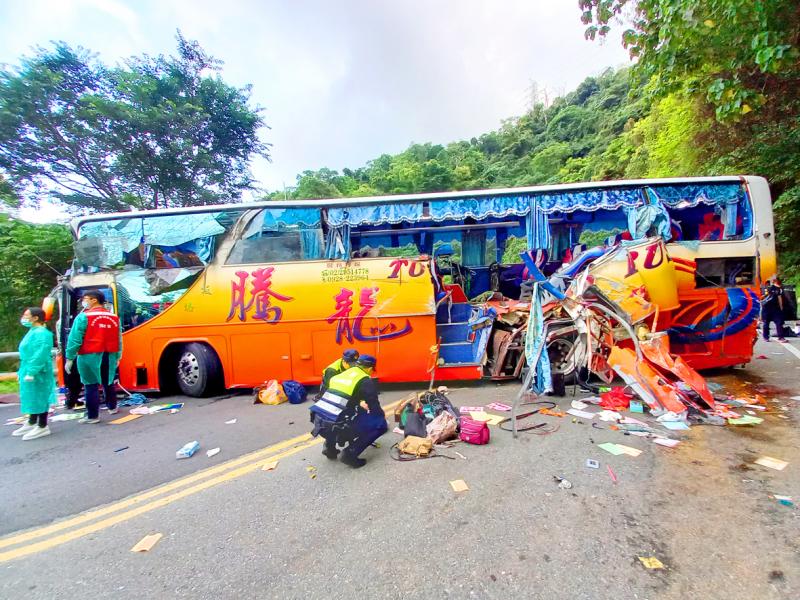Seatbelts are to be mandated for passengers on buses traveling on highways, expressways or freeways after lawmakers yesterday passed an amendment to Article 31 of the Road Traffic Management and Penalty Act (道路交通管理處罰條例).
The amendment — which applies to passengers aged four or older and drivers — was proposed after a bus crashed into the side of a mountain on the Suhua Highway in Yilan County’s Suao Township (蘇澳) on March 16, killing six passengers and injuring 39.
Some of the passengers were thrown from the bus by the crash.

Photo: Chiang Chih-hsiung, Taipei Times
Prior to the amendment, the act only required passengers sitting next to the driver, near doors, including emergency exits, as well as those sitting in the last row to wear seatbelts.
The amendment stipulates that drivers would face a fine of NT$3,000 to NT$6,000 if passengers aged four or older fail to follow the seatbelt requirement.
However, drivers would not be fined if passengers have been adequately informed about the seatbelt requirement, the amendment says.
Instead, passengers would be fined if they do not wear a seatbelt after being told to, it says.
Bus drivers who do not wear a seatbelt while driving would be fined NT$2,000, up from NT$1,500, it says.
The amendment also requires the Ministry of Transportation and Communications to set a date for implementation of the regulations and demonstrate to the public the correct way to fasten a seatbelt on a bus.
Lawmakers also passed an amendment to Article 18-1 of the act to require large cargo trucks and large passenger buses to have lateral protection devices.
Before Article 18 was amended, it only required such vehicles to have dashboard cameras and auxiliary visual devices.
Lateral protection devices would prevent motorcyclists from being entangled in the wheels of large vehicles during collisions, said Chinese Nationalist Party (KMT) Legislator Hung Meng-kai (洪孟楷), who proposed the amendment.
Following the amendment, all three devices must be installed on large cargo trucks and passenger buses, or drivers would be fined NT$12,000 to NT$24,000.
Drivers of commercial vehicles would be fined NT$9,000 to NT$12,000 if they fail to keep complete and accurate driving records, the amendment says.

The inspection equipment and data transmission system for new robotic dogs that Taipei is planning to use for sidewalk patrols were developed by a Taiwanese company, the city’s New Construction Office said today, dismissing concerns that the China-made robots could pose a security risk. The city is bringing in smart robotic dogs to help with sidewalk inspections, Taipei Deputy Mayor Lee Ssu-chuan (李四川) said on Facebook. Equipped with a panoramic surveillance system, the robots would be able to automatically flag problems and easily navigate narrow sidewalks, making inspections faster and more accurate, Lee said. By collecting more accurate data, they would help Taipei

STATS: Taiwan’s average life expectancy of 80.77 years was lower than that of Japan, Singapore and South Korea, but higher than in China, Malaysia and Indonesia Taiwan’s average life expectancy last year increased to 80.77 years, but was still not back to its pre-COVID-19 pandemic peak of 81.32 years in 2020, the Ministry of the Interior said yesterday. The average life expectancy last year increased the 0.54 years from 2023, the ministry said in a statement. For men and women, the average life expectancy last year was 77.42 years and 84.30 years respectively, up 0.48 years and 0.56 years from the previous year. Taiwan’s average life expectancy peaked at 81.32 years in 2020, as the nation was relatively unaffected by the pandemic that year. The metric

TAKING STOCK: The USMC is rebuilding a once-abandoned airfield in Palau to support large-scale ground operations as China’s missile range grows, Naval News reported The US Marine Corps (USMC) is considering new sites for stockpiling equipment in the West Pacific to harden military supply chains and enhance mobility across the Indo-Pacific region, US-based Naval News reported on Saturday. The proposed sites in Palau — one of Taiwan’s diplomatic allies — and Australia would enable a “rapid standup of stored equipment within a year” of the program’s approval, the report said, citing documents published by the USMC last month. In Palau, the service is rebuilding a formerly abandoned World War II-era airfield and establishing ancillary structures to support large-scale ground operations “as China’s missile range and magazine

Passengers on Taiwan High Speed Rail (THSR) will be required to use headphones and make phone calls in gangways under new “quiet travel” rules starting Sept. 22. THSR Chairman Shih Che (史哲) told media that THSR will run a three-month promotional campaign to ensure widespread adoption of the new rules. Those repeatedly ignoring the guidance face the potential termination of their transport contract, which can result in them getting escorted off the train, according to THSR. Shih shared his hope to cultivate an environment conducive to rest and reading for the train’s passengers, stating that these changes aim to “promote self-discipline” among passengers